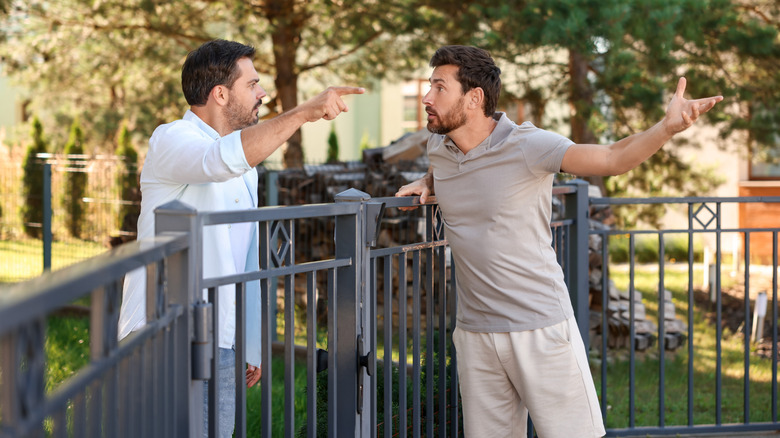Why HOAs Want You To Hide Your Trash Cans (And What Happens If You Don't)
When it comes to living in a subdivision, nothing ignites neighborhood drama faster than a rogue garbage can left out for too long. Most of us don't mean to offend the entire block when we forget to drag the offending bins back up the driveway after pickup, but HOAs often take even the occasional oversight very seriously. For communities that revolve around maintaining an elevated look and feel, visible trash cans quickly destroy the perfect illusion. If letting your can linger becomes a habit, it won't take long before a politely furious HOA violation letter arrives reminding you that community standards exist for a reason, per Section 485, Paragraph 236, Part Q, of your handbook.
While you may find all the fuss to be an actual load of rubbish, there's plenty of sound logic behind trash can rules. HOAs want to keep streets looking uniform and visually appealing to help preserve property values. A neighborhood with tidy curbs (and no scattered, overflowing neon-green bins) looks better in real estate photos and to potential buyers — not to mention to existing residents who often pay a premium in monthly HOA fees to make sure aesthetic expectations are enforced. Policies that require hiding your garbage cans behind a fence, inside a garage, or otherwise screened from view can also help discourage animals from rummaging through leftover trash, which creates health risks, odors, and general havoc.
Fines and strained relationships are likely consequences
Most HOA policies have fairly specific rules about when garbage cans can be visible, and they usually go well beyond what the law says about where you can place your trash. Although the exact requirements in your community may vary, most associations allow bins to be placed at the curb only on designated pickup days. Even then, they can't block sidewalks, driveways, or streets. Some HOAs also specify the type, size, or color of approved garbage cans, and a few even require residents to use a particular trash collection company. Outside of the approved pickup window, the goal is simple. Hide the eyesore as quickly and quietly as you can to keep streets and cul-de-sacs looking neat and uniform.
As long as HOA trash can regulations are aligned with state laws and the association's governing documents, and are fairly enforced, they are considered to be legally binding. Ignoring the rules usually starts with a reminder or a warning, but repeat offenders may find themselves subject to more severe consequences. Many HOAs have a system of fines, which can accrue by the day or by incident, increase with repeated offenses, or even result in a property lien when unpaid.
Although it's unusual for legal action to be taken against a homeowner by an HOA, revoking community privileges is another possible outcome. Disregarding the rules can create strained relationships between neighbors and the HOA board, and those who repeatedly break the rules may find themselves the subject of a lot of trash talk.

